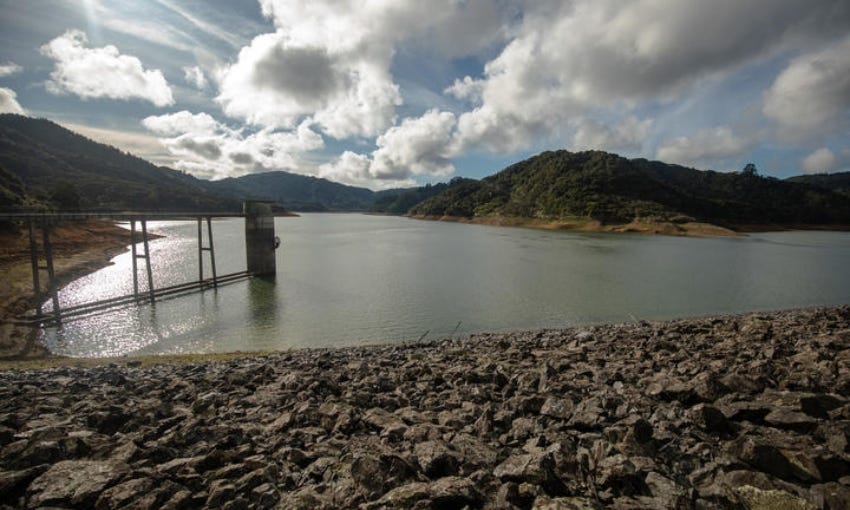Auckland drought leads to fears of severe water restrictions
Without either extremely heavy rain or massive savings, we're in for a shocker of a summer

Good morning and welcome to The Bulletin for Tuesday 23 June, by Alex Braae for The Spinoff. Presented in partnership with Z Energy.
In today’s edition: Auckland drought leads to fears of severe water restrictions, exclusive new poll results on government’s Covid-19 response, and is a resolution coming at Ihumātao?

Image: Low water levels at the Upper Mangatangi dam to the south of Auckland (Radio NZ, Simon Rogers)
The Auckland water crisis isn't getting any better, and the city's leaders are getting extremely nervous about the coming months. That is clear from the news yesterday that mayor Phil Goff has pitched for an application for water from the Waikato River to be part of the government's fast-tracked Resource Management Act process. As the NZ Herald's Bernard Orsman reports, the Waikato-Tainui iwi have objected to that, on the grounds that the project isn't at all Covid-related, and therefore shouldn't be part of a targeted Covid scheme. And a second point has been made by Waikato Regional Council chairman Russ Rimington, who says that Auckland delayed far too long to introduce water restrictions, starting them in May compared to Hamilton which had them in place last October. Even if the application were to be approved today, it would still take about a year to get pumping.
How bad is the situation right now? It's very concerning. Watercare keeps stats on storage dam levels, and at the moment they're sitting at about 45% full – the average for this time of year is more than 75% full. Total water use is coming down slightly, and there have been some good days of total use coming in under the target – for example yesterday Watercare tweeted that "AKL used 389,601m3 and on Sat the usage was 397,729m3 - both well below our daily target of 410,000m3." Households can of course do their bit here, and that accounts for more than half of the water used across the city. There are looming concerns though that commercial and industrial water users will start to see much heavier restrictions, which would put thousands of jobs at risk, reports Stuff's Todd Niall.
And how bad will it get by summer? Unless there is either extremely heavy and prolonged rain, or a massive improvement in water saving, it's going to be a shocker. Stuff reports that further household savings will be harder to achieve, because there are already bans on outdoor use – wasteful activities like washing the car and the like. That piece describes the chances of severe restrictions this summer as "touch and go".
What is the long term picture? At the moment the drought is being described as a 'one in 200 year' event, but that's based on normal climate patterns, which are gone forever. The reality is captured in this excellent feature by Radio NZ's Kate Newton, who has looked at weather projections for the next few decades. It's going to get much hotter and drier, and currently it's not at all clear that we're ready for that.
Just quickly, a message from The Spinoff's managing editor Duncan Greive:
"The arrival of Covid-19 and lockdown changed The Spinoff, transforming our editorial to focus on the biggest story of our lives, taking a small team and making it a seven day a week news operation. But it also fundamentally changed us as a business, too. Prior to the crisis, around 20% of our editorial costs were funded by our Members. Now, that figure is north of 50%. The loss of some key commercial clients meant that change has to be permanent. If you're already a member, please know that all at The Spinoff are incredibly grateful for your help. If you're not, and can afford to contribute, please consider doing so – it really is critically important to our ability to cover the next phase of the crisis, in all its complexity."
The government has confirmed that returning New Zealanders are a much higher priority than those needing limited quarantine facilities for economic reasons, reports Interest. The cost at this stage is in the tens of millions of dollars, and in the future returnees may be required to cover some of that for their stay. Despite what you may have seen with some Vision NZ party grandstanding yesterday, the border largely does remain closed. When it comes to returnees, it would not be legal to block New Zealanders from coming home – nor would there be any sound moral case for it. A range of other legal and border measures were announced yesterday, which you can read about in our live blog.
Meanwhile, we can exclusively reveal new polling results on how people are feeling about the quarantine system, the government's overall response to Covid-19 and more. The Spinoff/Stickybeak survey, taken over the weekend, has found that the events of last week dented public confidence in the response, even if it remains at high net positive levels. Opinion is more split on confidence in the quarantine system specifically. And enthusiasm for a travel bubble has started to diminish, with just under half of respondents saying it shouldn't be a priority at all.
As for new cases, there were two more yesterday, with both people in managed isolation. Dr Siouxsie Wiles has put together an excellent piece outlining why the types of new cases we have seen so far do not give any reason to panic. Yes, some aspects of the quarantine system have been badly managed, and need urgent correction – but just to reiterate the point made in the last few Bulletins, there is still no evidence of renewed community transmission. And that remains a very unusual situation compared to what the rest of the world is going through.
Could an agreement finally be coming on Ihumātao? One News' Jack Tame reports that it could be very close at hand. Among the details revealed in his story last night – PM Jacinda Ardern is understood to have been personally involved in the negotiations, and has set a deadline for negotiations at the end of this month. It is also understood that the next stage of the resolution would involve the formation of a rōpū whakahaere – effectively a trust with a board who would decide on the next steps.
Amid all the back and forth about whether Auckland's port should move north, plans are going ahead to try and deepen the shipping channel, reports Brent Melville for (paywalled) Business Desk. I say amid, because the question of a move north is still very much a live issue. Concerns are still being raised about both the economic and environmental impacts of such a decision, and the deepening is expected to give much bigger ships better access to Auckland.
AUT University, which is currently at the centre of a sexual harassment scandal regarding a now-departed top academic, has a particularly poor record of investigating such cases. The NZ Herald's Kirsty Johnston reports that the organisation has the lowest rate of actually following up with an investigation, at fewer than a third. By contrast, Auckland University has investigated every sexual harassment complaint made over the past five years. It follows a particularly ugly and prolonged case in which AUT's former Pro Vice Chancellor Max Abbott allegedly stalked and harassed a colleague over a two-year period.
A complaint has been laid with the IPCA over an arrest in which police brutality has been alleged. The incident was captured on video, and Radio NZ has a story about what happened – the established facts are that a man was tagging a wall, before being arrested by several officers who tackled him to the ground, which caused injury. The police allege he "violently resisted" arrest, while the man says he didn't resist at all. It has sparked debate about the use of force by police over minor crimes, with Manukau barrister Kingi Snelgar arguing that it was concerning and disproportionate.
Farmers in the Taranaki region have smashed out the planting of hundreds of thousands more native plants, reports the Rural News Group. Around 1200 landowners took part in the annual scheme, that allows farmers to buy the plants at cost from the regional council, with the overall goal of improving freshwater quality. Reporting from Radio NZ last year indicated progress is being made here, even if there is still a long way to go for many waterways. Still, the scheme is voluntary for farmers to participate in, so good on them for doing so, and long may it continue.
Got some feedback about The Bulletin, or anything in the news?
Drop us a line at thebulletin@thespinoff.co.nz

Right now on The Spinoff: Catherine Delahunty writes about taking the government to court over a new mine waste dump near Waihi on the Coromandel peninsula. Leni Ma'ia'i writes about the massive increase in food recalls, and what it shows about how the system is working. Steven Moe explores how artists and poets can bring colour and creativity onto corporate boards. Emma Gleason talks to the Maritime Museum’s volunteers about what the ocean means to them, and why sailing is more than an elite boy’s club. And young lad Eddie reviews the new Netflix gameshow The Floor is Lava.
For a feature today, a look at the changing face of London through the eyes of a drug dealer. The piece on Vice is a fascinating work of social history, even if at times it perhaps goes easy on the unsavoury elements of its lead character's personality. What really comes through in it is the march of gentrification, and the social effects that process has. Here's an excerpt:
When he got tired of dancing and pills, Eric moved into the bar room powder cocaine scene of the mid-2000s. "It was a bit calmer, and I didn’t have to party and show off so much," he says. It was around this time that London was being transformed amid a blizzard of British indie, cocaine, money, and the gentrification of whole swathes of the capital.
Eric saw his clientele change, as rising house prices uprooted the poor and replaced them with a swarm of middle class graduate professionals with money to burn. Gentrification did not just result in a rash of independent coffee shops and gastro pubs, it transformed the population. "In the mid-2000s I used to sell to the chavs and Jeremy Kyle type people in the pubs. Then the pubs started to look different and my customers became successful people, posh people," remembers Eric.
The chances of New Zealand co-hosting the 2023 Women's Football World Cup with Australia just got a lot better. The NZ Herald has bounced off the news from Japan that the country has pulled out – of the three bids that were still in play, Japan's bid was seen as the next best option for FIFA. It seems strange to think about international sporting events happening right now, but by 2023, who knows, we might have sorted some of the problems out. A decision is likely by the end of the week.
That's it for The Bulletin. If you want to support the work we do at The Spinoff, please check out our membership programme




